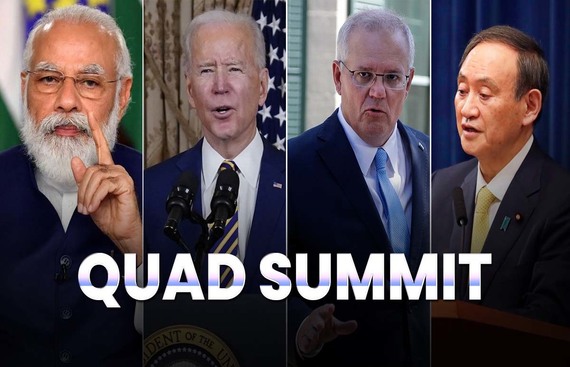Quad Summit 2021: Leap towards Securing Semiconductor's Supply Chain

The leaders from Australia, India, Japan, and the United States are all set to grace their presence in the maiden in-person Quad Summit 2021 that is to be held on September 24. This meeting is organized for the second time this year, post the virtual meet held on March 12, 2021. Again, US President Joe Biden will be hosting this Summit at White House and the other leaders, including Australia's Scott Morrison, Indian PM Narendra Modi, and Yoshihide Suga representing Japan. On account of the prolonged travel curb, the discussion were held virtual just seven months back, and this marks the first personal meet of the leaders post the pandemic outbreak.
In a statement, The US states, "Biden-Harris Administration has made elevating the Quad a priority, as seen through the first-ever Quad Leaders-level engagement in March, which was virtual, and now this Summit, which will be in-person. Hosting the leaders of the Quad demonstrates the Biden-Harris Administration's priority of engaging in the Indo-Pacific, including through new multilateral configurations to meet the challenges of the 21st century."
This first in-person Summit is slated to talk about the ongoing pandemic and what other possible measures the countries could take to accelerate their global vaccine supplies, climate crisis, collaboration on budding technologies and cyberspace, and encouraging a free and accessible Indo- Pacific. Alongside, some light would also be thrown on the semiconductor supply chain.
Agenda Set to Discuss
Before the Quad Summit, the Quad nations' leaders had set up an agenda to be focused on that includes creating a safe supply chain for semiconductors. This hints that all the four are keen on expanding their scope over the China in the Indo-Pacific, manufacturing giants, China in the Indo-Pacific. However, chief focus is set on the technological development, and robustly secures technology supply chains for hardware and software that are the nations' priority.
Furthermore, the countries are also keen on the challenges of making waves, such as illicit transfer and technology burglary. Thus, the quad nations intend to design and develop the technology so that it could be shared and reformed by the nations according to democratic values.
Additionally, the quad nations are set to roll out a joint initiative to analyze individual capability and their possible liability in semiconductor's supply chain. On this account, it is notable that the US and Japan have about 30 percent of chipmaking capacity. On the other hand, India and Australia do not possess any prominent chipmakers.
![]()
A Zest on India's Chipmaking
In the past few years, the Indian government has paid attention to semiconductor industries to turn self-sufficient in terms of the electronic sector. The Indian semiconductor industry is expecting high growth potential areas in the years to come. Thus, the government has taken several initiatives to support the industry.
The Indian government has devised to infuse about $10 billion in two computer chip manufacturing amenities to encourage high-end innovation. Alongside this, the Indian government has also elevated the incentive schemes allocation to INR 745 crore for expecting an augment in the semiconductor and the electronic manufacturing industry.
India's View
On his three-day trip to the United States to participate in the Quad Summit, Prime Minister Modi is likely to talk to the United Nations General Assembly. PM Modi landed in Washington DC a day before the Summit; he was warmly welcomed by senior officials of the Joe Biden Administration and India's Ambassador to the US Taranjit Singh Sandhu. Regardless of bad weather, many Indian Americans had gathered at the Andrews Joint Airforce Base to welcome the Indian Prime Minister.
![]()
In his tweet, Modi posts, "Grateful to the Indian community in Washington DC for the warm welcome. Our diaspora is our strength. It is commendable how the Indian diaspora has distinguished itself across the world."
India's statement says, "As part of their ongoing efforts to curb the covid-19 pandemic, they would re-examine the Quad Vaccine scheme which was announced in March this year. They would also swap views on contemporary global issues such as critical and emerging technologies, connectivity and infrastructure, cyber security, maritime security, humanitarian assistance / disaster relief, climate change and education. The Summit is likely to offer a valuable opportunity for dialogue and interactions among the Leaders, anchored in their shared vision of ensuring a free, open and inclusive Indo-Pacific region."
It further adds that the theme for this year's General discussion is 'Building Resilience through hope to recuperate from covid-19, reconstructs sustainably, respond to the planet's requirements, respect the rights of people, and revitalize the United Nations.
It is said that PM Narendra Modi will attend the Summit in New York on September 24. His word would mainly focus on global challenges that include the ongoing pandemic crisis, climate change, and addressing terrorism issues and other crucial matters. Following the Summit, the next day, Modi would be addressing the United Nations General Assembly (UNGA).
Quad
Quad refers to the Quadrilateral Security Dialogue it is a strategic dialogue between Japan, India, the US, and Australia. In 2007, Japan's then Prime Minister Shinzo Abe, Australian Prime Minister John Howard, Indian Prime Minister Manmohan Singh, and US Vice President Dick Cheney formed the Quad. However, the strategic Summit has been terminated post-Australia withdrawing from Quad during the tenure of then Prime Minister Kevin Rudd. Yet, the dialogue bounced back at the time of the ASEAN Summits 2017, when all the four countries' leaders agreed to restore the alliance all over again.
